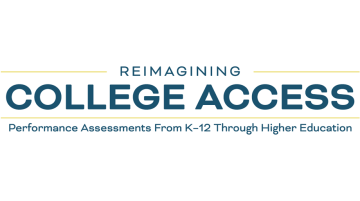New Performance Assessment Initiative Is Changing the Landscape of College Admissions

PALO ALTO, CA—Since August 1, students applying to some New England colleges and universities have seen a new option on their application forms allowing them to submit performance assessment artifacts (e.g., videos, lab reports, or extended research papers) alongside traditional application materials. The option is made possible through a national initiative, Reimagining College Access (RCA), that brings together more than 100 education organizations, k-12 school systems, and colleges and universities. The initiative brings these organizations together to foster deeper learning and the use of performance assessments in k-12 education and in higher education admissions, placement, and advising decisions.
Performance assessments have become an increasingly important tool for developing and measuring the deeper learning skills students need for success in the 21st century workforce such as problem solving, communication, and collaboration. In recent years, the drive for colleges and universities to consider performance assessment has gained momentum, with many colleges and universities making some use of performance assessments in their admissions processes.
"Reviewing portfolios as part of the admissions process has allowed us to understand the full breadth of a student's abilities and talents, in addition to what we can learn from a letter grade or a test score,” said Stuart Schmill, Dean of Admissions and Student Financial Services at the Massachusetts Institute of Technology. “This is important because the student learning experience is better when they participate in project-based learning, and prepares them well to study at MIT or any college or university. We are excited to help expand the number of students who have this opportunity across the country."
Performance assessments can help admissions staff get a broader picture of students’ achievements and potential for postsecondary success than some traditional admissions measures. Considering performance assessment information and artifacts can also foster increased equity and inclusion in college admissions as they provide expanded opportunities for students to demonstrate their college readiness. Some institutions may also use performance assessment after admitting students to inform decisions on course placement and supports.
RCA, which has facilitated the New England pilot, is led by the Learning Policy Institute in partnership with Education First and EducationCounsel. Five institutions of higher education (IHEs) are participating in this first cohort, supported by the Common Application, which provides the online platform for student application submissions. They represent a diverse range of small and large, public and private institutions, with varying degrees of selectivity. They are Castleton University, Clark University, Pine Manor College, Southern New Hampshire University, and Wheaton College. In addition, the Massachusetts Institute of Technology (MIT), is supporting the initiative and accepts performance assessment artifacts with student applications. More than 100 other IHEs, k-12 leaders, and policy and advocacy groups are also participating in the RCA learning community, and convene regularly to learn from the work taking place in the pilot.
“As colleges and universities like Clark move increasingly in the direction of experiential and practice based learning, it makes perfect sense to start to incorporate more authentic forms of assessment into the admissions process,” said Meredith Twombly, Vice President for Admissions and Financial Aid at Clark University. “On a broader scale I'm hoping this pilot will help drag an outdated admissions process out of the past and into the present, better aligning college admissions with what high quality teaching and learning look like today.”
"Deeper learning is foundational to Wheaton’s educational approach, which emphasizes interdisciplinary studies and hands-on learning with real world experiences,” said Judy Purdy, Director of Admission at Wheaton College in Massachusetts. “We want students to make authentic connections between the learning they do in the classroom and what they will take out into the world. Because our students will be immersed in deeper learning experiences, performance assessments provide an opportunity to learn more about the student who wants to make a difference, is curious about learning in non-traditional ways and has challenged themselves in and out of the classroom."
The pilot is a part of the national RCA initiative, working to advance research and practice that fosters deeper learning and effective assessments at all levels of the education system. Among other projects that the initiative is working on are efforts to launch pilots in other states and regions, develop a set of quality criteria for k-12 performance assessment systems, and identify best practices for representing those systems in high school profiles. The work on quality criteria aims to identify structures and practices that create high-quality, rigorous, equitable and fair performance assessment in k-12. The criteria can help improve quality in k-12 and build IHEs’ trust in the performance assessment information students submit. The school profile work supports the transfer of student information from secondary schools to IHEs and focuses on identifying best practices for secondary schools to describe their performance assessment systems, instructional practices, equity and access to high-quality learning.
For more information on Reimagining College Access, please visit: https://learningpolicyinstitute.org/project/reimagining-college-access
###
About the Learning Policy Institute
The Learning Policy Institute conducts and communicates independent, high-quality research to improve education policy and practice. Working with policymakers, researchers, educators, community groups, and others, the Institute seeks to advance evidence-based policies that support empowering and equitable learning for each and every child. Nonprofit and nonpartisan, the Institute connects policymakers and stakeholders at the local, state, and federal levels with the evidence, ideas, and actions needed to strengthen the education system from preschool through college and career readiness.
